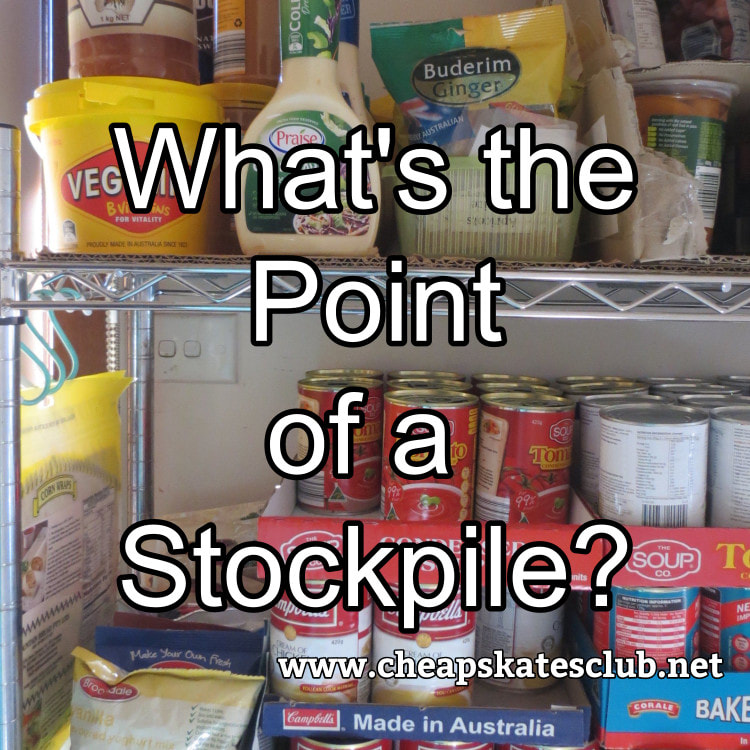Sentry Page Protection
What's the point of a stockpile?
Q. Why do you place so much emphasis on building a stockpile and keeping lots of food in the pantry when everything comes on sale regularly and supermarkets are everywhere? It doesn't make sense to me to put money into groceries I can buy anytime when I can use it for something else. Rosalie
A. Well this is an old question, but one that is very relevant in these times. We've all witnessed the madness that has taken hold of society in light of the COVID-19 crisis.
There have been fist-fights in the aisles of supermarkets over toilet paper! Shelves were cleared of basic grocery items; queues were to get into the stores, not just out of them.
Supermarkets implemented rationing on everything.
So do you understand why buying on sale regularly, and building up a pantry is important?
Yes, things have a sale cycle, and you can buy what you need, and just enough of what you need, until the next sale cycle.
But keeping a stocked pantry, is not just to save money (although that is a primary reason). It is to give you breathing room in a financial crisis. How much do you spend on groceries each week? Fortnight? Month? In a crisis, that money could be used to help, but not if you don't have a stocked pantry so you can stop shopping for a week, a fortnight, a month or even longer.
What if there is a natural disaster? While you may not think it will happen to you, there is always the chance of a cyclone, flood, earthquake that will disrupt supply chains for a while.
Or a strike. We haven't had serious strikes in Australia for a long, long time, but a transport strike would interrupt the supply chain and empty supermarket shelves in days.
Illness could strike. It may just be flu, that will knock you down for a week. Or it could be something more serious that will lay you flat for longer. You wouldn't be able to get out to shop, and may not feel up to doing an online order. Having groceries in the house means you can concentrate on getting well instead of getting to the supermarket.
Building a pantry is an investment, and it will save you money. And time. And energy. The size of your pantry is up to you, your budget and your lifestyle. There is no right or wrong size.
But you should at least have enough to cover one extra pay period. For instance if you get paid weekly, aim to have an extra weeks food in the house; if you get paid fortnightly aim for a fortnight, a month - yes, a month's worth of groceries. At least then if you can't shop for a pay period, you'll be able to eat for that long, possibly a bit longer if you stretch your groceries.
A. Well this is an old question, but one that is very relevant in these times. We've all witnessed the madness that has taken hold of society in light of the COVID-19 crisis.
There have been fist-fights in the aisles of supermarkets over toilet paper! Shelves were cleared of basic grocery items; queues were to get into the stores, not just out of them.
Supermarkets implemented rationing on everything.
So do you understand why buying on sale regularly, and building up a pantry is important?
Yes, things have a sale cycle, and you can buy what you need, and just enough of what you need, until the next sale cycle.
But keeping a stocked pantry, is not just to save money (although that is a primary reason). It is to give you breathing room in a financial crisis. How much do you spend on groceries each week? Fortnight? Month? In a crisis, that money could be used to help, but not if you don't have a stocked pantry so you can stop shopping for a week, a fortnight, a month or even longer.
What if there is a natural disaster? While you may not think it will happen to you, there is always the chance of a cyclone, flood, earthquake that will disrupt supply chains for a while.
Or a strike. We haven't had serious strikes in Australia for a long, long time, but a transport strike would interrupt the supply chain and empty supermarket shelves in days.
Illness could strike. It may just be flu, that will knock you down for a week. Or it could be something more serious that will lay you flat for longer. You wouldn't be able to get out to shop, and may not feel up to doing an online order. Having groceries in the house means you can concentrate on getting well instead of getting to the supermarket.
Building a pantry is an investment, and it will save you money. And time. And energy. The size of your pantry is up to you, your budget and your lifestyle. There is no right or wrong size.
But you should at least have enough to cover one extra pay period. For instance if you get paid weekly, aim to have an extra weeks food in the house; if you get paid fortnightly aim for a fortnight, a month - yes, a month's worth of groceries. At least then if you can't shop for a pay period, you'll be able to eat for that long, possibly a bit longer if you stretch your groceries.
